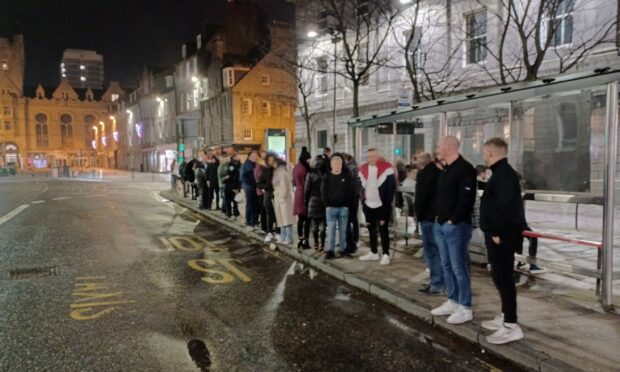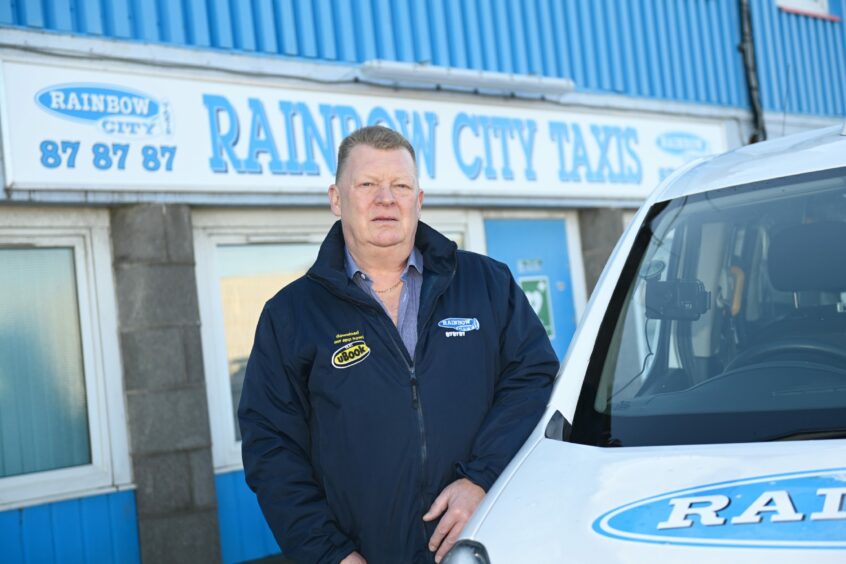Aberdeen’s taxi crisis could be worsened by new eco rules banning certain vehicles from the city centre.
The claim emerged as trade leaders laid bare the challenges facing the industry while appealing for permission to pass costs on to customers.
Among the changes mooted to prop up the struggling sector, increased night-time fares would start from 8pm rather than 10pm.
Bosses said the new Low Emission Zone scheme will mean some drivers need to replace their cars, adding to ongoing recruitment problems and fuel costs already hammering the profession.
The situation has led to misery for many people seeking a lift home, with huge queues a regular sight in the city centre and at Aberdeen International Airport.
The latest review of cab charges have now been backed by the council’s licensing committee, and could be rubber-stamped this summer.
What’s the background to Aberdeen taxi fare rise?
Aberdeen City Council officers had put forward two proposals for consideration.
The first would have seen basic fares rise by 10%, while the second suggested a 20% hike.
Fares in the city were last increased in early 2020.
Taxi firms did request a slight increase last year but it was refused.
However, cabbies were given permission to pass on any charges they receive from Aberdeen International Airport on to customers.
What costs could soon change?
Despite the local authority’s proposals, Aberdeen’s taxi firms had drawn up their own charges and asked members to back them.
They suggested that the basic tariff start at £3 for the first 950 yards of a journey, up from the current £2.60.
And they asked for a change to existing weekend charges.
Currently, there’s a surcharge of £1 on top of standard fees from 10pm on Friday until 8am on Monday.
But cabbies suggested introducing a basic charge of £5 instead, with costs then increasing depending on distance travelled.
Night-time costs could rise during the week too.
Bosses asked that they be amended to begin two hours earlier, with the £1 surcharge being applied from 8pm instead of 10pm.
Finally, people who leave drivers waiting as they scramble to get ready to leave the house could also be stumping up more.
Waiting times are currently calculated at a rate of £23 per hour waiting, so a 15-minute delay could cost £5.75.
Under an increase to £27, that same delay would mean an extra £6.75 before the taxi even gets moving.
Why are increases needed?
Rainbow City Taxis boss Russell McLeod told the meeting about the major difficulties facing local cabbies.
Cars are becoming more expensive to buy, while servicing and parts have also shot up in price – leaving many out of pocket.
And drivers will face extra financial pressures as many will have to buy new vehicles to meet Aberdeen’s Low Emission Zone (LEZ) regulations.
Under the scheme, drivers using “high-pollution” cars will be fined if they stray into certain areas.
Taxi drivers need ‘positive’ change amid ‘significant’ losses
Mr McLeod argued that the fare change was needed to encourage more drivers to work in the evenings and over the weekend.
He also believes the changes could attract new drivers to the trade.
He said: “There needs to be an incentive, we need more drivers to try and work in the evenings.
“The last three years has seen the trade absorbing significant cost across the board.
“Nothing has moved in a positive direction, we have an opportunity to change this.”
And it’s a situation that’s causing frustration among customers.
Due to driver shortages, people have been left facing long waits – often in chilly temperatures – for taxis.
‘It’s all a balancing act’
While councillor Steve Delaney noted it was a “difficult situation” he wanted members go with the council’s option to raise fares by 10%.
The depute provost believed that a 20% increase would harm the city’s taxi fleet.
He said: “We need to encourage more drivers back into the trade.
“On the other hand, we’ve got to make sure that taxis are affordable to the public.
“It’s all a balancing act.”
Call made to ‘stabilise’ Aberdeen’s taxi trade
But councillor Marie Boulton backed the trade’s proposals, saying it was a “win-win” for everyone.
“If we want to make sure visitors as well as our residents have sufficient numbers of taxis, we have to work with the companies,” she said.
“At the moment what we need to do is stabilise the trade and listen to those who are trying to operate their businesses for the benefit of the city.”
Members went on to support the trade’s proposal.
What happens next?
A further report on the matter will come before the committee in June for councillors to make a final decision.
If approved, the fare increase would be implemented at the end of July.





Conversation